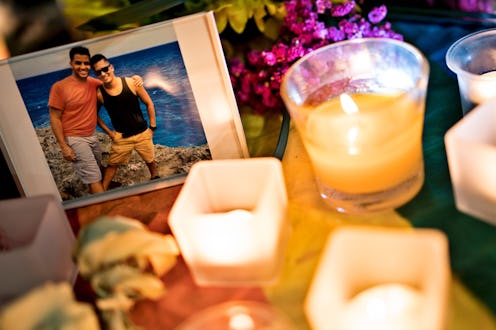News
Gay Men Can Buy A Gun, But Not Donate Blood
In the aftermath of the Orlando shooting that left 49 people dead and 53 others wounded at a gay nightclub named Pulse on June 12, many Americans are frustrated with the United States' weak gun control legislation. However, gun control regulations are not the only laws causing (understandable) frustration after the attack in Orlando — for the LGBTQ community, the Food and Drug Administration rule banning gay men from donating blood until they've been celibate a full year is particularly infuriating. On Twitter, many individuals highlighted the seemingly absurd fact that in America, gay men can purchase guns, but cannot donate blood.
While thousands of Floridians donated blood to the Orlando victims on Sunday, it was perhaps those most affected by the shooting, and most desperate to help out, that often could not donate their blood: LGBTQ men. The FDA enacted the rule that bans gay men from donating blood in 1983 during the AIDS epidemic. According to the Columbia Medical Review, after much backlash, the ban was reassessed in 2015: now gay and bisexual men are allowed to donate blood, but only if they have been celibate for the twelve months prior to their donation.
Twelve months is a long time, and after the Orlando shooting, the Twitter-sphere quickly pointed out that while gay or bisexual men must be celibate for an entire year before they can donate blood, there is a mere three-day waiting period to buy a gun in Florida.
The Orlando shooting highlights the discrimination that members of the LGBTQ community face in the U.S., not merely because this community was the target of the attack, but also because gay and bisexual men were not allowed to help out after the shooting by donating blood — due to a (dated and irrational) fear that they could possibly be infected with HIV/AIDS. The Columbia Medical Review pointed out that all donated blood in the U.S. is tested for HIV, which makes the FDA ban seem discriminatory rather than precautionary.
The shooting in Orlando has made gun control and discrimination against the LGBTQ community twin key points of discussion in the U.S. When the topics are considered together in the aftermath of the Orlando shooting, it's hard not to be disheartened by the state of gun control legislation, and the violent discriminatory acts that LGBTQ people face daily (cough, North Carolina, cough). However, the Twitter response to the ban on gay and bisexual men donating blood shows that legislation in the U.S. often seems to be more focused on discriminating against gay and bisexual people than on protecting gay and straight people alike from gun violence.
Clearly, tighter gun control laws are necessary, but so is a reassessment of laws that discriminate against members of the LGBTQ community — as the response after Orlando proves, the two issues are now forever intertwined.
